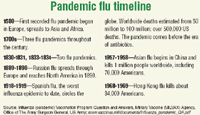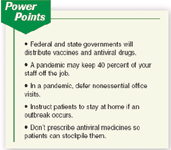Article
Avian flu: Is your practice ready?
Whether the bird flu scare is real or just so much hype, it doesn't hurt to have a commonsense game plan.
Annie Skaggs will be a road warrior if an influenza pandemic strikes her community. She's stocked her 1997 Ford Escort wagon with goggles, gloves, a heavy-duty mask, gowns, stethoscope, and other medical gear.

Skaggs takes predictions of an influenza pandemic seriously, and studies show that most of her colleagues do too. Six out of 10 physicians think it's either very or somewhat likely that the dreaded avian flu virus will mutate and achieve human-to-human transmission within the next five years, according to HCD Research. Almost as many believe the virus will reach our shores.

Fortunately, there are things you can do in advance of an influenza pandemic that don't involve panic or Herculean striving. Just learning how to monitor the threat is a start. And if the avian flu doesn't morph into a human pandemic, your efforts won't be in vain. As history has shown, some other killer flu like the one in 1918 could be around the corner.
While physicians like Annie Skaggs are ready to suit up for a pandemic, other physicians are watching, waiting, and wary of what they consider overblown predictions. "Looks like media hype that is pseudo-intellectual," says urologist Dan Witt in Hoisington, KS.
"This is not 1918," adds orthopedic surgeon Paul Ross in Pawlet, VT. "We have antibiotics at our disposal for secondary bacterial infections."
Older doctors, of course, remember the false alarms triggered by the Swine Flu episode of 1976. Fearing a pandemic, the Ford administration rushed to vaccinate the entire country. The program was cancelled in midstream when no pandemic emerged and those vaccinated were found to have a higher rate of Guillain-Barré Syndrome.






